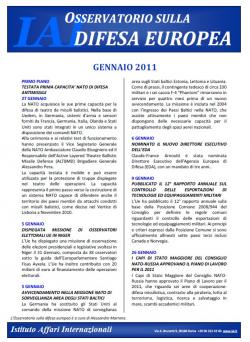Observatory on European defence, September 2005

8-9 September 2005
Informal EU Justice and Home Affairs Council - Countering International Terrorism
On the occasion of the Informal Justice and Home Affairs (JHA) Council of 8-9 September, EU Ministers discussed measures to counter terrorism and in particular the issue of the telecommunications data retention. Concerning the latter, some disagreements remain among the States which, however, committed themselves to studying ways to achieve it, especially by looking into the issues of legal basis, costs for the operators and balance between citizens’ security and protection of their freedom. The European Parliament rejected the proposal on it submitted on 27 September by France, United Kingdom, Ireland and Sweden, while preferring that of the European Commission submitted on 21 September. It also approved the allocation of 7 million euros for pilot projects for countering international terrorism: 5.4 millions for a European programme for critical infrastructure protection and early warning and coordination systems in case of crisis; 1 million for studies on terrorism and 1 million for debates. The informal JHA Council reviewed the implementation of the measures adopted by the extraordinary JHA Council held on 13 July following the terrorist attacks in London and presented a European intelligence model for the fight against crime.
20 June 2005
Eu Missions - Aceh (Indonesia), Moldova, Middle East
In September the foundations were laid for the launch of some new EU missions. On 9 September the Council adopted a Joint Action for a mission monitoring the peace agreements between the government and the separatist guerrillas in the Indonesian province of Aceh. The mission (227 civil experts with a budget of about 15 million euros) takes place from 15 September 2005 to 15 March 2006; the EU is acting in cooperation with some states in the region.
On 20 September the EU Political and Security Committee (COPS) decided, upon a request of last 2 June from the governments of Moldova and Ukraine, to launch a control mission at the borders between the two countries (in particular in the Transnistrian region). The mission should last 6 months from 1 December 2005 and involve about 15 observers and trainers for the local authorities (budget about 3 million euros).
Concerning the situation in the Middle East, on the occasion of the Quartet (EU, US, UN, Russia) meeting of 20 September, the EU Commissioner for External Relations Waldner declared that the EU will send observers to the Rafah crossing point on the border between the Gaza Stripe and Egypt.
September 2005
NATO Missions - Kosovo, Darfur, Afghanistan, Iraq
During the month of September, NATO adopted several decisions relative to ongoing missions. On 1 September the Italian General Valotto assumed command of the NATO KFOR mission in Kosovo for a year, and will lead the transformation of the forces present in the country.
On 21 September NATO decided to extend until 31 October the operations in Darfur (Sudan) supporting the peace-keeping mission AMIS of the African Union (AU), in order to complete the strategic airlift of the last 3 battalions of African forces in the framework of the expansion of the AU mission (from 3,320 to 7,700 units by September 2005). In carrying out this task, coordination between the NATO Supreme Headquarters Allied Powers Europe (SHAPE) and the EU's coordination unit for strategic air transport, the European Airlift Centre (EAC), continues.
The UN Security Council (Res. No. 1623) extended the mandate of the NATO ISAF mission in Afghanistan for a year from 13 October.
ISAF has reached full operational capability in the western area of the country and extension in the south was decided in principle during the informal meeting of NATO defence ministers on 13-14 September.
Finally, in the framework of the NATO training mission in Iraq, the military Academy, which will train about 910 officers of the local armed forces annually, was inaugurated on 27 September. The structure has a staff of about 165 people, 24 of which are trainers. Some members of the Atlantic Alliance, like France and Germany do not participate in the mission on Iraqi territory, while contributing in others ways.
September 2005
EU - Non Proliferation - Iran
Following the appeal by the United States and European countries, on 24 September the International Atomic Energy Agency (IAEA) adopted a resolution assessing the Iranian nuclear activities as non compliant with the Non Proliferation Treaty (NPT). The resolution, approved by a majority of votes by the IAEA Board of Governors (with the abstention of Russia and China) was rejected by Iran, in spite of the fact that the text neither brings the case to the UN Security Council (even if it foresees the conditions for doing so), nor envisions sanctions.
The EU Presidency declared its willingness to continue negotiations between the EU-3 (France, Germany, United Kingdom and Solana) and Teheran, in spite of Iran's rejection, in August, of the European set of proposals and the subsequent resumption of Iran's enrichment activities.
September 2005
EU, NATO - US - Civil Protection, Katrina cyclone
Following the disaster in the New Orleans region caused by Hurricane Katrina, the United States submitted a formal request for emergency aid to the European Union and NATO. On the basis of the US requests for food, medical, logistic and transport aid, the European Union mobilized its control and information centre for Civil Protection of the European Commission's DG Environment and NATO coordinated the Allies' response through its Euro-Atlantic Disaster Response Coordination Center (EADRCC).
-
Details
Roma, Istituto affari internazionali, 2005 -
Issue
05/09


